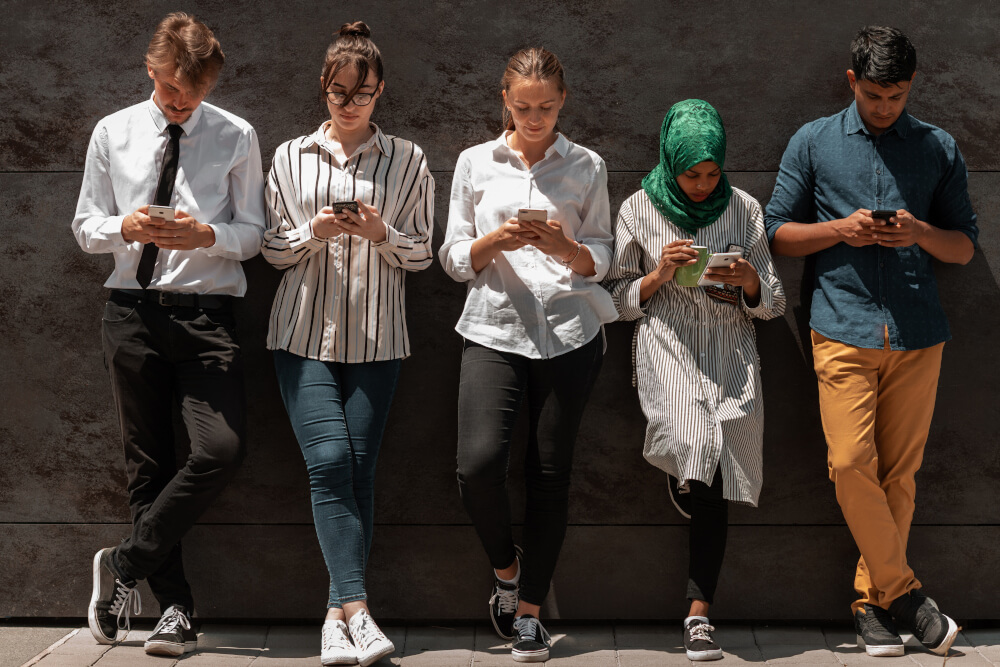In today’s fast-paced world, most of us are guilty of spending an excessive amount of time on our mobile phones. In our ‘always-on’ society, these devices have become a lifeline for work, leisure, and social activities. But when does this seemingly harmless scrolling transform into a full-blown phone addiction? According to Google Trends, a staggering 95% of Android users pick up their phones every six minutes and receive notifications every seven minutes. Over the past five years, the search volume for ‘cell phone addiction’ has also surged, indicating that many South Africans are worried about their potentially unhealthy relationship with their phones.
Understanding Phone Addiction
In broad terms, addiction refers to “the strong and harmful need to regularly have or do something.” Phone addiction manifests as the compulsive overuse of a smartphone, where individuals may experience the fear of being without their phone (known as nomophobia) or the inability to send or receive messages (referred to as textaphrenia) because their phone has become an integral part of their lives. Some individuals may even encounter “phantom vibrations,” a sensation that their phone is sending alerts when it’s not.
Mobile phone addiction is considered a behavioral pattern akin to internet addiction, love and sex addiction, and other online compulsions, including gaming and gambling addictions. It entails developing a habitual and dependent pattern of smartphone use that has adverse effects on one’s life, often resulting in a loss of impulse control.
What Drives Smartphone Addiction?
Individuals grappling with psychological and emotional issues such as stress, depression, loneliness, and social anxiety are particularly susceptible to developing technology-related addictions. The experiences that smartphones offer—social media, games, videos, and apps—can trigger pleasure responses in the brain. Some theories suggest that the release of dopamine, a neurotransmitter associated with pleasure, in response to smartphone use can mimic the effects of consuming alcohol or drugs.
As society becomes increasingly reliant on smartphones for everyday tasks, business transactions, and social interactions, the number of people struggling with mobile phone addiction naturally rises. More business activities than ever before are conducted via smartphones, and the growth of social media means that some individuals spend an average of 3.5 hours per day on their phones.
A recent global survey also revealed that the Covid-19 pandemic has exacerbated mobile phone addiction. The study indicated that approximately 70% of internet users, especially young people, increased their smartphone usage as a direct result of lockdown measures. As smartphone usage escalates, so does the risk of addiction.
Recognizing the Symptoms
While heavy smartphone use is prevalent, the concern arises when your phone starts to interfere with social interactions, work, or daily life, indicating a potential problem. If you find yourself reaching for your phone to seek happiness or fill a void, this could be a sign of an unhealthy and destructive habit.
We adopt a person-centered, holistic approach to treating phone addiction. We utilize a combination of one-on-one counseling sessions, peer support, and group therapy sessions. Each person is assessed individually, and their life as a whole is examined to understand their challenges before creating a personalized care plan. Since phone addiction is a relatively new phenomenon, we initially assess whether therapy would be beneficial.
So, how can you discern if you’re addicted to your phone? It’s not solely about the amount of time spent on your mobile device. Other behaviors can also indicate smartphone addiction. You may find yourself easily distracted, lying about your phone usage, experiencing heightened stress when your battery is low, or feeling angry when someone or something prevents you from using your phone.
Mobile phone addiction can have a detrimental impact on various aspects of your life, from your relationships with family and friends to your performance at work. Often, individuals displaying addictive behaviors are unaware of how their phone addiction directly affects their health and relationships.
The Impact on Loneliness and Insecurity
Some individuals heavily rely on their phones to combat feelings of loneliness and depression. Paradoxically, the pressures of social media or misinterpretation of text messages can exacerbate these emotions.
Sleep Deprivation
Whether it’s checking work emails right before bedtime or browsing the web immediately upon waking up, mobile phone addiction not only hinders your ability to fall asleep but also compromises the quality of your sleep.
Difficulty in Maintaining Focus
Constant interaction with your phone disrupts your workday and impairs your ability to study. Mobile phone addiction can also lead to procrastination, causing you to forget important tasks or become so engrossed in phone-related activities that critical responsibilities are neglected.
Becoming Self-Absorbed
An obsession with compulsively checking social media, sharing images of food, holidays, and oneself can create a barrier between you and those you’re with. This fixation can lead to a stronger connection with your online world than the real one.
Treatment for Mobile Phone Addiction
The first step involves helping individuals curtail undesired behavior—in this case, excessive mobile phone use. Subsequently, we apply evidence-based treatments to alter their mindset and develop techniques to prevent relapses. Our approach includes a wide range of innovative therapeutic processes, ranging from psychoeducational workshops to somatic healing, all aimed at fostering positive, lasting change.

